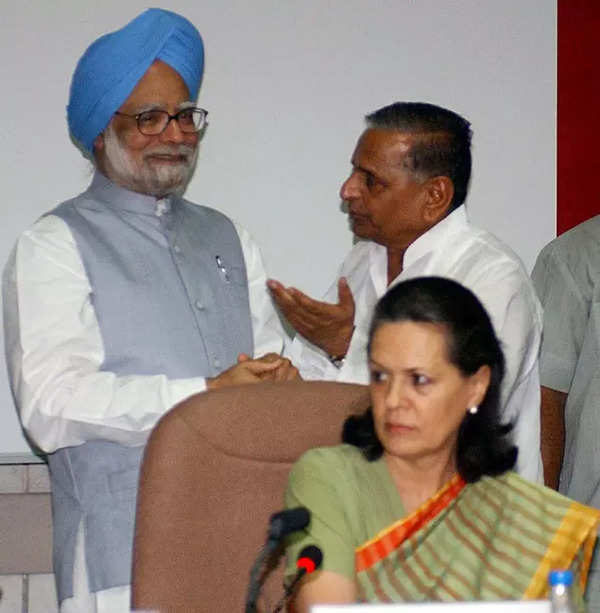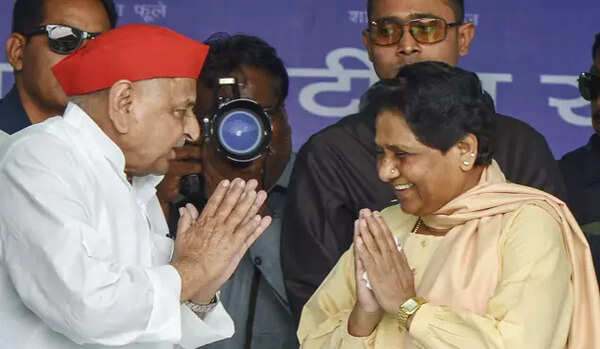passed away on Monday after a prolonged illness. He was 82.
Ten-time MLA, 7-time MP, 3-time UP CM, one-time defence minister, and founder of UP’s most prominent political clan. Mulayam, fondly known as “Netaji”, has had a storied political career spanning over five decades.
A veteran of many political battles and a pivot for opposition politics for decades, Mulayam never went off the radar — even when he was ailing.
“Netaji sansad mein hote hain ya sadak pe,” his supporters would say often, testifying to his connection with the people as well as his national profile.
Almost became Prime Minister

Beyond UP, Mulayam Singh Yadav was a key figure in national politics too. In fact, he narrowly missed out on becoming the Prime Minister of the country, not once but twice.
In 1996, when the United Front was poised to form the government, Mulayam Singh’s name was floated to lead the alliance.
It was opposed by leaders, including Lalu Prasad Yadav.
He again saw an opportunity in 2014 but the election results dampened the possibility forever.
People close to him said that the Samajwadi patriarch nursed a grievance that he could not become the Prime Minister of India despite being the chief minister of the most-populous state three times.
Arrested during Emergency

In 1975, when Prime Minister Indira Gandhi’s government imposed the Emergency, Mulayam Singh was among the politicians who were arrested and imprisoned for 19 months.
While he opposed Congress during the Emergency, he supported it in 2008 for the India-US nuclear deal.
Overall, he had been jailed nine times during different agitations for the protection of rights and welfare of farmers, labourers, youth, students, minorities and backward classes.

In 2019, he sprang a surprise by praising PM Modi in Parliament, wishing that he would return as Prime Minister after the next election.
“I wish pradhan mantriji becomes pradhan mantri once again,” he said.
I had many interactions with Mulayam Singh Yadav Ji when we served as Chief Ministers of our respective states. The… https://t.co/6W75RLfkfu
— Narendra Modi (@narendramodi) 1665376457000
Mulayam Singh Yadav Ji distinguished himself in UP and national politics. He was a key soldier for democracy during… https://t.co/iMbuTDQN2T
— Narendra Modi (@narendramodi) 1665376340000
While Modi folded his hands to thank him and NDA members thumped the table to welcome Yadav’s statement, Congress president Sonia Gandhi looked flustered.
The remark baffled analysts since SP was BJP’s main opponent in UP, India’s politically crucial state.
Watch the video here
Stopped Sonia from becoming PM

He perfected the game to pin his rival in politics. And Congress’s Sonia Gandhi was among those who was on the receiving end of his ‘Charkha Daav’.
Mulayam famously stopped Sonia Gandhi from becoming the PM after the Vajpayee-led NDA government lost the trust vote in 1998.
Banking on his support, Sonia had claimed to have the support of 272 MPs, but Mulayam backed out, citing her “foreign origin”.
The last-minute back out was seen as the primary reason why Sonia could not ascend to the top post.


Though Mulayam became an MLA for the first time in 1967 at the age of 28, it wasn’t until 1992 that he founded the Samajwadi Party.
Shortly after SP was launched, Mulayam turned it into a regional party based in Uttar Pradesh.
Under Mulayam and his son Akhilesh, SP came to power four times in the state and is still the biggest opposition party after the resurgence of BJP in 2017.
As SP chief, Mulayam struck deals with the Bahujan Samaj Party, the Bharatiya Janata Party and the Congress whenever he needed to form or save the governments led by him in Uttar Pradesh.
Akhilesh Yadav, his son, became the party president in 2017 after a feud with uncle Shivpal Yadav. Even though he is already at the helm of affairs and has his team in place, Mulayam Singh has left behind him a void that will be hard to fill.
According to political observer JP Shukla, Mulayam had stopped running the everyday affairs of the party long back, but his blessings were sought before every major decision by the party chief.

He became the chief minister of UP thrice: 1989-91, 1993-95, and 2003-07.
Before becoming CM for the first time, Yadav was leader of opposition in the UP Legislative Council and then in the state assembly.
In 1989, he assumed the top post in UP with the BJP extending outside support to his Janata Dal government.
When the saffron party withdrew support over the Babri Masjid-Ram Janmabhoomi issue in 1990, the Congress kept his government afloat for some months.
In November 1993, he again headed a government in UP, supported by the BSP. It collapsed when the ally pulled the rug.
After moving to the national stage for some years, Mulayam returned to the state in the early 2000s.
In 2003, he became UP chief minister for the third time after the collapse of a short-lived BSP-BJP coalition government.
In 2012, the SP was again in a position to form the UP government. But this time the senior Yadav stepped aside so that his son Akhilesh could become the state’s youngest CM at 38.

Mulayam also served as the defence minister of India from 1996-98 in the United Front government headed by H D Deve Gowda.
During his term, India finalised the Sukhoi fighter jet deal with Russia.
Former defence minister AK Antony recalled Mulayam as a far-sighted defence minister who always advised caution against China.
” … during every discussion on defence in Parliament, he had just one thing to say ‘be wary of China’, if not, it will be difficult to tackle. See how right he was,” Antony said.
Ordered police firing on karsevaks

Mulayam always established himself as a champion of the minorities. His SP was always seen as an ally of the Muslim community.
During his first tenure as CM in October 1990, he was given the sobriquet of ‘Mullah Mulayam’ after he ordered firing on Kar Sevaks who were going to Ayodhya’s Babri Masjid. The BJP still rakes up the 1990 firing episode to target Mulayum.
In the 1990s, he was among the key leaders who took on the BJP’s ‘kamandal’ politics.
The 16th century mosque was eventually razed in December 1992, the same year Yadav founded the SP.
But the 1990 firing incident ended up becoming a watershed moment in Mulayam political career, earning him the trust of Muslims who became his party’s major voting bloc.
The guest house controversy

On June 1, 1995, Mulayam, then the chief minister, received a note from an IAS officer: Mayawati was about to pull the plug on his one-and-a-half-year-old government.
Mayawati, then BSP general secretary, was putting up at the State Guest House in Lucknow. On June 2, she was holding a meeting with her party MLAs. That’s when SP MLAs and workers descended on the guest house and went on the rampage.
The attack lasted barely an hour. SP netas, carrying firearms, barged into the room where Mayawati was holding her meeting. Those who tried to stop them were hit with rifle butts. A few of them were bundled into waiting vehicles and taken away.
Mayawati had to lock herself inside her room after being reportedly rescued by BJP leader Brahm Dutt Dwivedi. He stood guard outside her room till the attackers left.

समाजवादी पार्टी के व्योवृद्ध नेता व यूपी के पूर्व मुख्यमंत्री श्री मुलायम सिंह यादव जी के आज निधन हो जाने की ख़बर… https://t.co/CQKooOibDo
— Mayawati (@Mayawati) 1665377699000
The episode turned BSP and SP into bitter foes for many years until 2018 when the parties finally joined hands for bypolls in UP.
Foot-in-mouth remarks

Over the years, Mulayam often invited trouble for his sexist and anti-women remarks.
At a rally in 2014, he triggered a major outrage when he spoke against the death sentence for rapists, saying “boys will be boys… they commit mistakes”.
In 2012, he kicked up a row with his remark that rural women will not benefit from the Women Reservation Bill because they are not as attractive in comparison to those from the affluent class.
In March 2010, when the bill was tabled in the Rajya Sabha for approval, Mulayam had made a similar remark: “The Women Reservation Bill, if passed in present format, would provoke young men to whistle in parliament.”
In 2015, Mulayam said that “rape by four people was not practically possible.”
“One person commits rape and four are named in the complaint. Can such a thing happen? It is impractical. Is that even possible,” he had said, triggering yet another row.
His advocacy of the idea that India, Pakistan and Bangladesh should form a confederation also triggered a major backlash.






